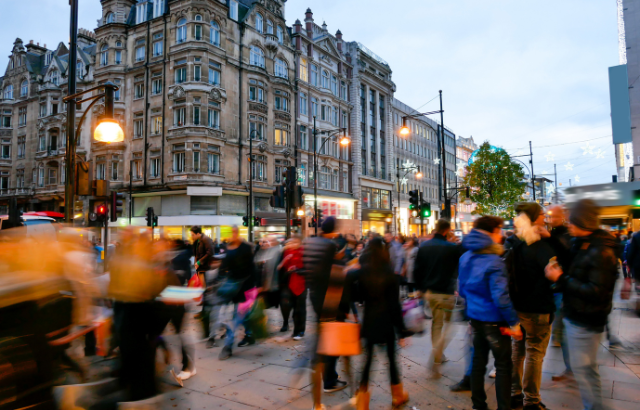Exploring the future of the Labour Party at the Mile End Institute
In the run-up to the Labour leadership election, Queen Mary University of London’s Mile End Institute organised a one-day conference on the future of the party. The event attracted a diverse range of politicians, journalists and activists.

Picture of Jeremy Corbyn who is due to stand down as leader of the Labour Party
Following the 2019 general election Labour suffered its biggest defeat since 1945 which triggered a Labour leadership contest. Debates about the future direction of the party have continued as the ballot draws closer. Queen Mary’s Mile End Institute brought together a range of stakeholders and Labour insiders to explore this topic in depth.
Voices from the party
Tim Bale, Professor of Politics opened the proceedings with two In Conversation events with Angela Smith, Baroness Smith of Basildon (Leader of the Opposition, House of Lords) and Bridget Phillipson MP (Houghton and Sunderland South), both of who are supporting Sir Keir Starmer in the forthcoming leadership contest.
“I endorse Keir Starmer. I am not against other candidates per se, but I am less enthusiastic about the deputy leadership candidates,” said Baroness Smith.
Bridget Phillipson MP believes that the Labour Party needs to be less nostalgic as it tries to rebuild trust among the public. “The country has changed. The Labour Party needs to stop looking back. It is seductive for all of us but it’s not how you win elections. We have to provide a hopeful vision for the future,” she said.
On her support for Sir Keir Starmer, she added: “Keir Starmer is by far the best candidate, someone who has authority and understands how to make change happen.”
What is Jeremy Corbyn’s legacy?
One of the major points of debate throughout the day centred on Jeremy Corbyn’s legacy as leader of the Labour Party. Chris Bryant MP (Rhondda) said: “Corbyn’s main legacy is the election of Boris Johnson with a majority of 80 and the worst result since 1945 […] Labour enabled Brexit with Corbyn failing to campaign properly for Remain.”
The despondent feelings were also reflected by other panellists. Andrew Harrop, General Secretary of the Fabian Society said: “Corbyn presided over appalling, shameful and criminal anti-Jewish racism. Corbyn also had personal failings; he was weak in leadership and failed to get a grip on the issue and failed to move decisively and swiftly.”
However other participants, such as Dr Eunice Goes (Richmond University) and Emina Ibrahim, Councillor and Vice Chair of Momentum, shared a more pragmatic view. “As a party we seem to replay old battles […] Debates in full public view on social media have shown that kindness and honesty have disappeared,” said Emina Ibrahim.
A time for change
Journalist Emma Burnell believes that Labour has many challenges ahead and that the party needs to change or face political oblivion. “Labour does not have a sense of how much it needs to change […] Factionalism has led the party down dangerous alleyways […] Momentum is not militant, it is progress from the other side […] Factions who work together should be applauded, not seen as traitors,” she said.
Wes Streeting MP (Ilford North) added: “The Labour Party deserves a cup tea and a slap in the face. Is it prepared to change? If not, does it deserve to exist? If this isn’t the time to change then when is?”
Dr Jake Watts (Birkbeck, University of London) said: “There is an antagonistic culture in the Labour Party with binaries of right and wrong. It manifests online with social media.”
Reflecting on splits in the Labour Party, Guardian journalist Martin Kettle said: “More humility is needed […] Labour also needs a southern strategy. If Labour wants to win it needs to win seats from the counties around London, in addition to those in the north of the country.”
The choice of leader was paramount to winning another election according to YouGov’s Marcus Roberts: “There is no guarantee of survival if Labour continues down this path with leaders that are unpopular with voters,” he said.
Stella Creasy MP (Walthamstow) provided some closing comments to the conference. Summing up she said: “Never again should Labour go into an election promising to take the country back to a world that no longer exists.”
About Queen Mary’s Mile End Institute
The Mile End Institute at Queen Mary University of London brings together politicians, policymakers, academics and the public to discuss and debate the major challenges facing the country in a fast-moving world and ever-changing world.
Previous guests at Mile End Institute events include Rory Stewart, Jacob Rees-Mogg MP, Sam Gyimah MP, John Bercow MP, Diane Abbot MP, Nick Clegg MP, Yvette Cooper MP and Ken Clarke MP.
More information
- Find out more about the Mile End Institute
- Study Politics at Queen Mary.
Related items
For media information, contact:
